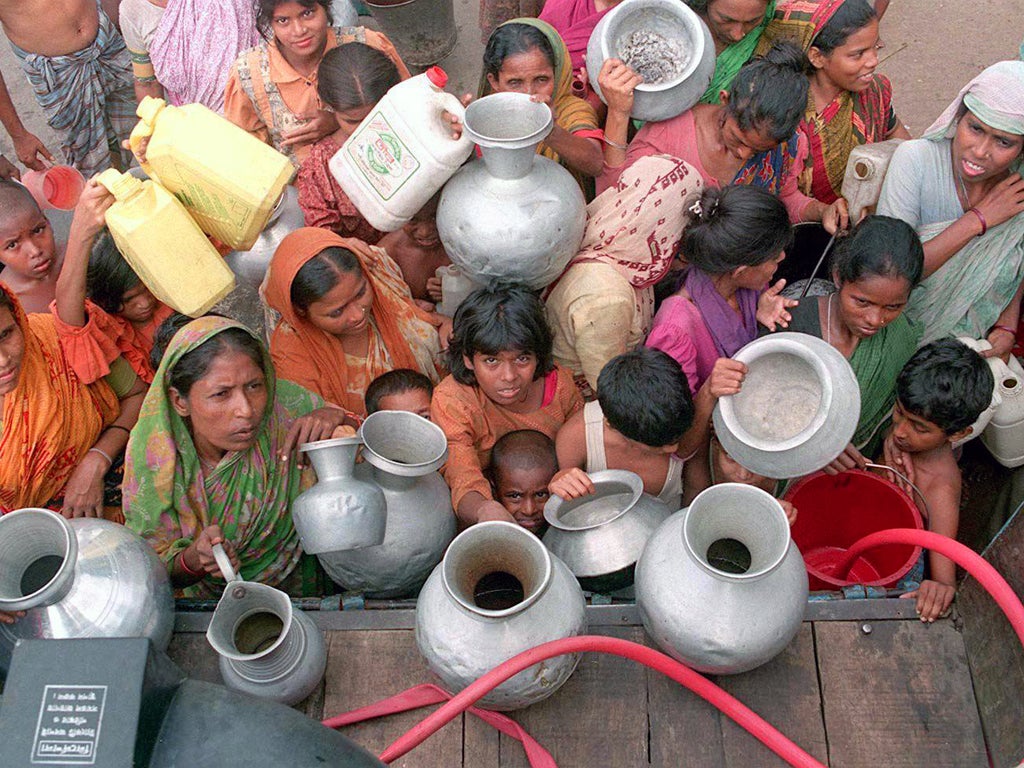Your support helps us to tell the story
From reproductive rights to climate change to Big Tech, The Independent is on the ground when the story is developing. Whether it's investigating the financials of Elon Musk's pro-Trump PAC or producing our latest documentary, 'The A Word', which shines a light on the American women fighting for reproductive rights, we know how important it is to parse out the facts from the messaging.
At such a critical moment in US history, we need reporters on the ground. Your donation allows us to keep sending journalists to speak to both sides of the story.
The Independent is trusted by Americans across the entire political spectrum. And unlike many other quality news outlets, we choose not to lock Americans out of our reporting and analysis with paywalls. We believe quality journalism should be available to everyone, paid for by those who can afford it.
Your support makes all the difference.The number of people on planet Earth has jumped from six billion to seven billion in 13 years.
So, in the time it took a child born in 1998 to reach adolescence today, the world's population has increased by another billion. According to the United Nations, which delivered the jaw-dropping statistic, the world's population could hit nine billion in another 30 years. When we are presented with statistics on the global population, it is important to remember that we are not dealing with numbers but instead we are referring to human beings. Consequently, as investors we should be looking at industries that can help people to lead a fulfilling life.
One of the best places to start could be with Abraham Maslow's hierarchy of needs. Maslow theory is often depicted as a pyramid with the largest and most fundamental of physiological needs forming the base. In the main, what Maslow had to say should be obvious to everyone, though we sometimes take many of the basic things in life for granted. However, we need to remember that physiological needs are the basic requirements for human survival. If these basic requirements that include water, food, heat and housing are not satisfied, then the human body cannot function and everything else is irrelevant.
Water is a basic need and it is perhaps one of the most misunderstood of commodities. Water is admittedly a commodity in the same way that gold, silver, zinc and iron are commodities. But it is largely unaffected by economic cycles. In other words, we need clean, drinkable water all the time, and demand for the wet stuff is increasing.
More importantly, though, there are no known substitutes. Hong Kong tycoon Li Ka Shing probably recognised this when he splashed out a tidy sum earlier this year for Northumbrian Water. Other water companies worth considering include United Utilities and Severn Trent. So, while water may appear plentiful right now, it is possible that demand for potable water may outstrip supply.
Food is another of Maslow's basic requirements for survival. As the number of mouths that need to be fed increases then so does the demand for food. It is easy to say we need to grow more, rear more and harvest more. But 850 million people around the world are going hungry and food shortages will only get worse unless we improve the way food is produced.
This is where science will play a vital role. Leading the way is Swiss agricultural business Syngenta, which is at the forefront of crop protection and the world's third-largest seeds producer. Many of Syngenta's discoveries should help to improve crop yields, improve pest and weather resistance and cut down the amount if water and fertilisers needed. Closer to home, Genus is a world leader in applying science to animal breeding and making advances through biotechnology. Its expertise has not been lost on Chinese farmers who want fatter cows that can produce more milk.
Energy is a basic need for survival too. As the global population grows, then so will demand for heat and light. In the UK, outages are a rare occurrence but the same cannot be said of developing countries. Consequently, demand for sources of energy sources that include oil, coal and gas will grow, which means that the days of cheap energy are unlikely to return. There are likely to be substantial investments in energy sources such as renewables, nuclear and eventually fusion to limit the impact of rising energy prices. In the meantime, the tried and tested industries should not disappoint. There is a reason why they say "Never sell Shell".
David Kuo is director of financial advice site fool.co.uk

Join our commenting forum
Join thought-provoking conversations, follow other Independent readers and see their replies
Comments